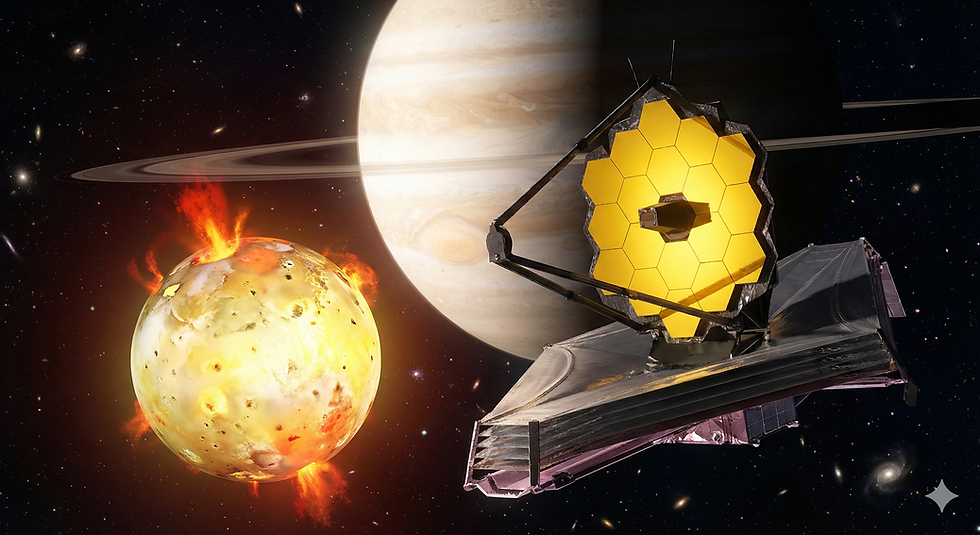Black Hole Information Paradox: An Open Mystery in Theoretical Physics
- tanisha

- Feb 28, 2025
- 3 min read
Black holes are among the most mysterious objects in the universe, devouring everything that crosses their event horizon. But what happens to the information about the matter that falls in? Does it vanish forever, or does nature have a way of preserving it?
This question, known as the Black Hole Information Paradox, is one of the most perplexing unsolved problems in physics. It emerges from a conflict between two of our most fundamental theories: General Relativity (GR) and Quantum Mechanics (QM). Solving these puzzles may hold the key to a deeper understanding of the universe.
The Clash of Two Pillars of Physics (GR vs QM)
1. General Relativity (GR) – Einstein’s Theory of Gravity
GR describes black holes as regions of space where gravity is so strong that nothing, not even light, can escape.
Any information about an object that falls into a black hole is seemingly lost forever, trapped beyond the event horizon.
2. Quantum Mechanics (QM) – The Laws of the Microscopic World
Quantum mechanics asserts that information can never be truly destroyed—only transformed or scrambled.
This principle is called unitarity, and is essential to our understanding of everything from atoms to computing to the very fabric of reality.
The Paradox - Which of these theories is correct?
If black holes permanently erase information, that violates quantum mechanics. But if information is somehow preserved, then general relativity must be incomplete. This fundamental contradiction suggests that something is missing from our understanding of physics.
Hawking Radiation and the Information Crisis
In 1974, Stephen Hawking discovered that black holes are not completely black, despite its name. Due to quantum effects, they emit a faint glow of particles which is now known as Hawking radiation.
Over time, this radiation causes a black hole to slowly evaporate and eventually disappear.
The problem? Hawking radiation appears to carry no information about what fell into the black hole.
If the black hole vanishes, any information about the objects it consumed should vanish with it—violating the rules of quantum mechanics.
This deepened the paradox: Where does the lost information go?
Proposed Solutions: Bridging the Divide
Physicists have proposed several possible resolutions to this paradox, with each having profound implications for our understanding of space, time, and reality.
1. The Holographic Principle – Reality as a Projection
The Holographic Principle suggests that all information in a black hole is actually stored on its surface (the event horizon), rather than inside it. This is similar to a hologram projecting a 3Dl image from a 2Dl surface.
This idea implies that the universe itself might be a hologram (whaat!?), where all information about what happens inside is encoded on a boundary.
2. Black Hole Complementarity – Information Exists in Two Places at Once
This theory suggests that information is both lost and preserved, depending on the observer.
From an outsider’s perspective, information never truly enters the black hole—it remains encoded on the event horizon.
But from an infalling observer’s perspective, the information does cross the horizon and meets its doom.
The catch? No single observer can witness both realities, preventing a contradiction.
3. Wormholes & Entanglement – The ER=EPR Conjecture
Some physicists suggest that black holes may be connected through wormholes (hypothetical tunnels through spacetime).
If information enters a black hole, it might not be lost but teleported elsewhere in the universe via quantum entanglement.
This concept, known as ER=EPR, proposes that black holes and entangled particles may be deeply linked.
4. Soft Hair & Black Hole Memory
Some researchers suggest that black holes are not entirely featureless but instead carry "soft hair." This term is the subtle quantum imprints of the information black holes consume.
This might allow information to escape gradually, encoded in Hawking radiation.
Why This Matters
The Black Hole Information Paradox is not just an abstract mystery, but a doorway to understanding some of the deepest questions in physics.
1. Unlocking Quantum Gravity
Resolving the paradox could lead to a long-sought unification of quantum mechanics and general relativity (QM + GR), giving us a complete theory of quantum gravity.
2. The Fate of the Universe
If black holes erase information, could the universe itself eventually erase its past?
If information is preserved, does that mean black holes could function as cosmic time capsules?
3. The Nature of Reality
If black holes follow the holographic principle, could the entire universe work the same way?
Are we living in a reality where everything we experience is merely a projection of a deeper, hidden layer of physics?
The paradox remains unsolved. Whatever the solution may be, one thing is certain: Black holes are not just cosmic voids—they hold the secrets to the very foundations of the universe.
Note: Take a look through previous articles to dive deeper into the basics of black holes and the nature of reality!



Comments